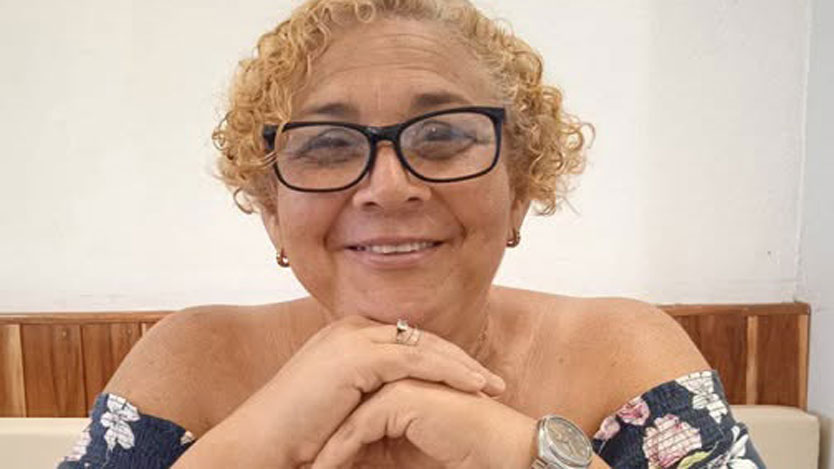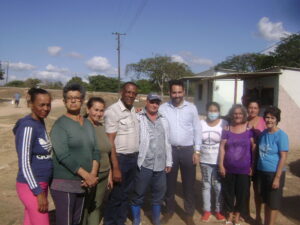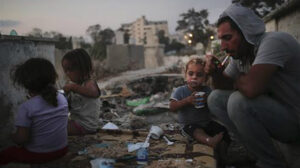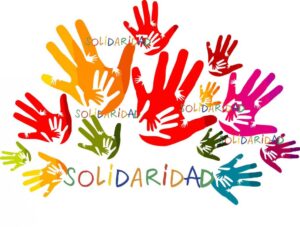Inés María Cervantes, a prestigious broadcaster who was awarded the Caonabo Lifetime Achievement Award in 2024.
The profession of voice-over that she has been developing since 1991, has given her the mastery of conversation, the coherence of ideas and the ability to link them with each other. In addition to her loquacity and power of synthesis. She is a woman who constantly surpasses herself and, with this, she gets what she wants.
Her feminine empowerment comes through in her clothes and in her walk through the streets of Morón, from the house to the radio, to the television and vice versa, she is seen to be firm and self-confident.
She is convinced that her family has a special image of her and places her almost as an idol, not only professionally, but also as an example of a devoted mother.
She has memories of all kinds which she stores with great affection. And she keeps them and uses them as anecdotal banners, examples in talks and lectures to future generations.
She is an optimistic woman who firmly believes that a better tomorrow is possible, especially when she has achieved, blow by blow, many of her dreams from radio and television, from the family.
What is Inés’ day-to-day life like?
-My day starts very early. It’s a habit I’ve had for many, many years. I have to leave several things early to be able to start my working day and my responsibilities to my family. Going to the radio, working until 4:00 in the afternoon, recording many times for television, because I have a weekend slot there that takes up my time.
-So, is your family a big support for you?
-I’ve been lucky to have a family that has always supported me. My mum was always there to look after my daughters, so that I could do whatever I wanted to do as a broadcaster at any time. I always had my dad’s support, his advice and his being there beside me, telling me things. Also, my husband, who has accompanied me to everything, to voice-over events, to the Diploma in Journalism, and much more. He is the one who, when I had doubts, told me «yes, why not, you can do it». I also have my daughters, who are now my unconditional support.
-I am certain that they have you as an idol for everything you do and how you do it. Did you have idols in radio and television when you were a child?
-In my house there was a lot of radio and television. But I never gravitated towards the media. However, life led me to it, because it seems to me that if I had had an idol, it was the person who led me to radio and television: my father, Efraín Cervantes. I had the chance to accompany him to Radio Surco, when he worked there, as well as to Radio Morón. I think that’s how I found myself in that fascinating world with the magic of credibility. Of course, in those days, there were great figures in voice-over and animation in our country, but, as I was never a child who said «I’m going to be a broadcaster», I only had one idol, who, of course, was my father.
-What would be the things you think you have bequeathed to future generations with all this time devoted to work?
-If I have bequeathed anything it has been the love for radio, responsibility, naturalness and humility when sitting in front of a microphone, and that everything you do on a daily basis has to be for the listeners who are your raison d’être. We have faced difficult problems in life and we have had to enter that radio booth, after forgetting every difficulty; and when that microphone, that light, is turned on and you say «I’m on the air», respect for the person who is listening to you is fundamental.
«The radio gave me the opportunity to train new generations through voice-over courses. It’s something very nice that I never thought I’d get to do, and yes, when I started at Radio Morón, it was very useful to have been able to be alongside immense figures like Arquímedes Romo, Jorge Nilo Marín, Elizabeth Iparraguirre, Héctor Francisco Consuegra, and very talented directors and sound directors of a different level.
-There are those who maintain that many of the ills of our society can be eradicated through the family, do you think so?
-Of course. I start from the assumption that the family is the school where everything is formed and from where the human being is born and, of course, is inserted into society.
«So I would say that we, as a family, are the ones who are most responsible for explaining, many times, for convincing and not imposing, but also for explaining to people in the best possible way the reality of what is happening, its causes, and many other things. But we are not the only ones, schools also have their part to play.
-Are you one of those who still consider Ciego de Avila as the Capital of Cuban Speech?
-Well, the new generation has the great challenge of maintaining that status, and I believe it will succeed. My generation was able to maintain that status that was given to us, for example, with artists of the word like Ibrahim Ulloa, Magda García Marrero, Joaquín Pardo, Laritza Ulloa, and so many others who gave their lives to radio and who made radio reach such high levels; and even those who, from the capital of all Cubans, still defend the voice-over done in Ciego de Ávila.
-Does the Caonabo prize for Life’s Work, which you recently won, give you a good or bad feeling?
-As I’m not superstitious, I hope it’s not an omen for a fatal outcome from now on. I’m going to take it to mean that, from there, beautiful things can happen in 2025 on a professional level and even on a personal level. So let’s take the award as a path that can open up for good things in my life.
-What does Morón mean to you?
-It’s the place where I was born, where I had a beautiful childhood. Here I studied and became a professional; I met friends, including those who are no longer here, but who remain, despite the distance. It is the place where I got married and had my daughters and raised a family. Morón is the place where, in an ossuary, the remains of people very dear to me are kept, people I carry with me every day: my brother and my father. Morón has been my refuge, my home. It is the place where, unquestionably, if at some point I am not here, I would have to return.
-How would you motivate a young broadcaster who, after taking courses and trying out in front of a microphone, decides to move on to other professions away from broadcasting?
-I think this is something we are currently facing, and I say we are facing, because it is the media in general in Cuba. Young people who take a course in voice-over and are trained as such, aspire to a higher economic remuneration than what they can give us. Life is very complicated, nobody can solve that so easily; that’s a reality. But it seems to me that if at some point you decided to train as a voice-over artist, for example, and you like the profession, it shouldn’t matter so much the shortages, or the social situation you’re going through; if you love what you do, if you love what you do and respect it, it seems to me that you could combine it with something that makes you earn a little more, but that doesn’t take you too far away from what you decided to be at some point.
«I have almost the same basic needs that everyone else has, but I don’t see myself in anything other than voice-over; I decided for it, it’s what I like, what I enjoy, what I want, what I do and what I will do». (Author: Vasily M. P.)




